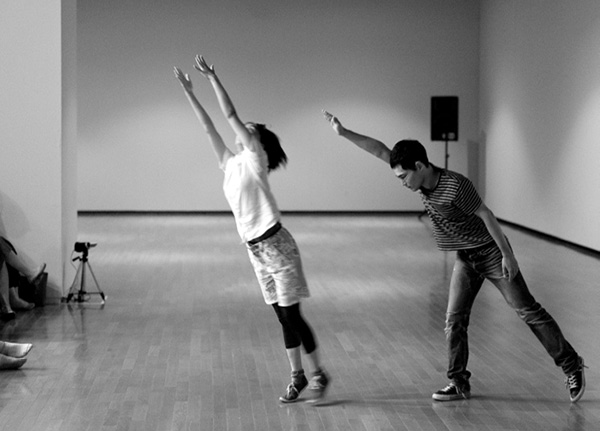
HALF OF US
first performed on August 31, 2012
The National Museum of Modern Art, Tokyo, Japan
performed once in 2012
SHINICHI TAKASHIMA
Mari Fukutome, Eijiro Takahashi
Tokyo, Japan
576962772s576962772h576962772i576962772n576962772t576962772a576962772k576962772s576962772h576962772i576962772n576962772t576962772a576962772k576962772@576962772g576962772m576962772a576962772i576962772l576962772.576962772c576962772o576962772m
HALF OF US
SHINICHI TAKASHIMA
-
What is the difference between talking to someone else and talking to oneself, conversation and monologue?
-
What is the difference between solitary catch—throwing a ball against a wall—and two people playing catch?
-
What is it like when two persons separately play this solitary catch instead of playing catch together? What is it like to conduct monologues in a twosome?
-
When playing catch, the thrown ball is clearly directed to you, but when playing catch with a wall, it isn’t. You throw a ball against the wall and that leads to the next trajectory. The result of your own action bounces back to you to become the reason of your next action, and it goes on. Even so, if the wall, which just inflects the track of the ball, seems like your partner, what kind of situation is that?
-
Why doesn’t it equal playing catch to be hit by a stray ball? What if when playing catch, the ball is visible but the partner is not? When playing catch with walls, more attentions are drawn to the behavior of the balls.
-
If it were only the time of throwing a ball when you need a partner, it would be a kind of illusion that you feel you are catching your partner himself when actually catching a ball. No, it might also be an illusion that you feel the partner is necessary to throw a ball. By the way, is there any problem if you call it illusion? There sure is. If it is an illusion, “I threw a ball right above and it hit him” would equal to “I threw a ball to him and it hit him.
-
Is it possible to conduct monologue without supposing any particular person including yourself? Monologue is imagined dialogue.
-
Willful negligence—a form of thinking that, by throwing as many balls as possible right above, he would be hit by a ball without any intention to hit him.
-
How can we identify each affair in the series of unexpected circumstances? A: Unexpected affair that a stray shot appeared from nowhere. B: Unexpected affair that the partner threw a ball in an unfamiliar way. C: Unexpected affair that a stray ball flew to you but that it was actually thrown against you. D: Unexpected affair that the ball thrown against you was actually just a stray ball.
-
What kind of situation is it that a ball is your only partner? If a ball becomes your partner, does the role of the ball have to be taken over by anything else?
-
Playing catch with a wall is not a rehearsal for a real game of catch. In fact plain catch is a rehearsal for the real game of catch with a wall. It cannot be possible to learn how to carry out conversations after learning monologue. You always have to learn from someone to start speaking and to start thinking with such a language you have got. That is the way things go. However, if the catch with a wall and the catch with a partner are both rehearsals, what is the real part?
-
Why does a man want to claim that “Human beings can think even before attaining languages” by using words?